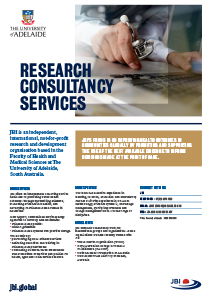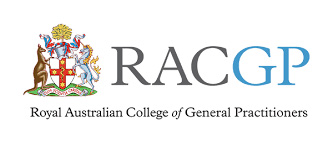
CONSULTANCY
JBI offers expert, customised services that help agencies to develop and maintain evidence-based policies, clinical guidelines, and evidence-based systems and practice change.
Our Services
JBI's research consultancy services are dedicated to promoting better health outcomes through synthesising evidence, translating evidence into action, and developing an evidence-based culture in healthcare.
We perform independent, rigorous evidence reviews; deliver education and training in evidence-based healthcare; and conduct evidence-based assessments, and evaluations of health, aged and social services and policies.

Our Expertise
Our team has extensive experience in teaching, research, evaluation and consultancy. Our staff are experienced in GRADE methodology, evidence synthesis, knowledge management, quality improvement, and change management from a broad range of disciplines.

Our Clients
JBI conducts research consultancy work for local, national and international groups and organisations. See examples of our research consultancy work.

Royal Australian College of General Practitioners
JBI was commissioned by the Royal Australian College of General Practitioners (RACGP) to assist with revising the second edition of ‘Supporting smoking cessation: A guide for health professionals’.
Recommendations in the guide are based on the research conducted by JBI to appraise, extract and synthesise the best available evidence to support Australians to quit smoking. GRADE (Grading of Recommendations Assessment, Development and Evaluation) methodology was used to conduct a review of the evidence and assess the certainty of the findings from the available research. The transparent and systematic processes of the GRADE evidence to decision framework were applied to develop recommendations from the evidence.
A key finding of this research was that combination pharmacotherapy is superior to monotherapy. Combination pharmacotherapy includes combination nicotine replacement therapy (NRT), which is the use of two forms of NRT together, for example using both a nicotine patch and nicotine gum to help quit smoking. Using Varenicline, a drug which blocks the pleasure and reward response to smoking, and NRT together is another type of combination cessation therapy.

National Heart Foundation of Australia
Evidence appraisal to inform guidelines for the management of heart failure and atrial fibrillation
This project commissioned by the National Heart Foundation of Australia, underpinned the latest updates of the Heart Foundation’s national guidelines for the diagnosis and management of heart failure and atrial fibrillation. Five clinical questions were addressed for each guideline and the completed reports presented the evidence base for the Heart Foundation’s Expert Working Groups to finalise recommendations for clinical practice. Each report included the results of systematic database searching, study selection considering predefined inclusion and exclusion criteria, critical appraisal/risk of bias assessment of all eligible studies and extraction of descriptive and outcome data, providing a final synthesis of the quality of included studies and of relevant outcomes. The guidelines will inform treatment and management of heart failure and atrial fibrillation in Australia until their next update.

New South Wales Ministry of Health, Australia
The impact of integrated care on hospital and emergency department utilisation and patient-reported outcomes: a rapid review
This was one of a series of reviews commissioned by the New South Wales Ministry of Health, Australia. The focus of the review was on integrated care for people with chronic conditions. In total, the review identified and included 25 relevant systematic reviews and meta-analyses. Integrated care was generally found to have positive benefits on patient-reported outcomes, including patient satisfaction, quality of life, empowerment, self-efficacy, and health literacy. In terms of health service utilisation measures, some systematic reviews reported improvements with integrated care while others showed no difference when compared to usual care. Overall, the evidence suggests that integrated care may reduce the risk of hospital admissions and re-admissions, but has limited influence on emergency department presentations and mortality. Length of stay was reduced with integrated care for patients with some chronic diseases. The information presented in the review will assist in monitoring and benchmarking integrated care initiatives in New South Wales, Australia.